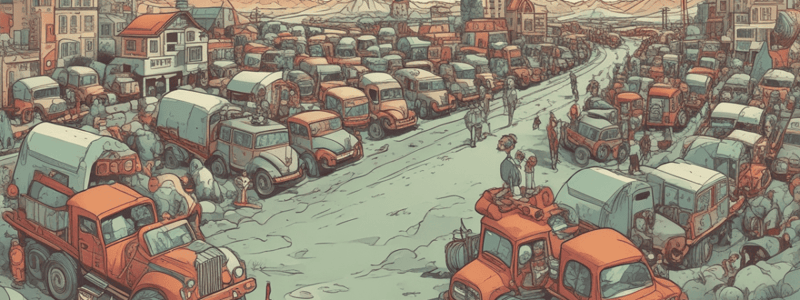Podcast
Questions and Answers
What was the primary reason for women entering the paid workforce in large numbers in the late 1970s?
What was the primary reason for women entering the paid workforce in large numbers in the late 1970s?
- To take advantage of new job opportunities created by globalization
- To participate in the growing service sector economy
- To achieve gender equality in the workplace
- To maintain their family's standard of living as male wages decreased (correct)
What was the result of the financial crisis of 2008 on the American economy?
What was the result of the financial crisis of 2008 on the American economy?
- A shift in economic power from corporations to small businesses
- A significant increase in union membership
- Widespread job losses and a decline in economic mobility (correct)
- A rapid recovery of the middle class
What was Robert Reich's prediction in 1994 regarding the rise of a proto-fascist leader in the US?
What was Robert Reich's prediction in 1994 regarding the rise of a proto-fascist leader in the US?
- That it would be a response to the growing power of corporations
- That it would be the result of a decline in the middle class and increasing economic inequality (correct)
- That it would be triggered by an increase in union membership
- That it would be caused by a surge in economic growth
What was the impact of the North American Free Trade Agreement (NAFTA) and China's entry into the World Trade Organization (WTO) on the middle class?
What was the impact of the North American Free Trade Agreement (NAFTA) and China's entry into the World Trade Organization (WTO) on the middle class?
What was the response to the financial crisis of 2008 and the perceived failures of the establishment?
What was the response to the financial crisis of 2008 and the perceived failures of the establishment?
What was the basis of Trump's appeal to working-class Americans?
What was the basis of Trump's appeal to working-class Americans?
What has the Biden Administration done to address income inequality?
What has the Biden Administration done to address income inequality?
Why is it important for Democrats to embrace a populist economic message?
Why is it important for Democrats to embrace a populist economic message?
What has contributed to the decline of organized labor and the lack of public understanding of its importance?
What has contributed to the decline of organized labor and the lack of public understanding of its importance?
Why is understanding the historic context of the decline of the middle class and the rise of populism important?
Why is understanding the historic context of the decline of the middle class and the rise of populism important?
Flashcards are hidden until you start studying
Study Notes
The Rise of Populism and the Decline of the Middle Class
- In 1994, Robert Reich predicted the rise of a proto-fascist leader in the US, citing widening inequality and the erosion of the middle class.
The Causes of Economic Inequality
- For 40 years, the typical American wage, adjusted for inflation, has not increased in real purchasing power.
- Since the late 1970s, the middle class has been shrinking, and good unionized manufacturing jobs have been lost.
- The structure of the economy has shifted, with corporate raiders and private equity taking over corporations, prioritizing shareholder returns over stakeholder capitalism.
- Women entered the paid workforce in large numbers in the late 1970s, not by choice, but out of necessity, to maintain their family's standard of living as male wages decreased.
The Role of Globalization and Trade
- Globalization has led to the loss of jobs, without any effort to help workers cope with the consequences.
- The North American Free Trade Agreement (NAFTA) and China's entry into the World Trade Organization (WTO) are examples of trade policies that have contributed to the decline of the middle class.
The Decline of Unions and the Rise of Anti-Unionism
- In the 1950s and 1960s, 35% of private sector workers were unionized, but today it's down to 6%.
- Unions have become more popular in recent years, but anti-union efforts and laws have restricted their growth.
The Financial Crisis of 2008 and Its Aftermath
- The financial crisis led to widespread job losses, and many Americans were unable to recover.
- The Occupy Wall Street and Tea Party movements emerged as a response to the crisis and the perceived failures of the establishment.
The Rise of Populism and Demagogues
- Populism is a rejection of elites and the establishment; Bernie Sanders and Donald Trump tapped into this sentiment in 2016.
- Trump's appeal to working-class Americans was based on his perceived authenticity and willingness to challenge the status quo.
The Biden Administration's Response
- The Biden Administration has taken steps to strengthen unions, promote labor standards, and address income inequality through policies like the Inflation Reduction Act.
- The administration has also taken an activist approach to antitrust law, targeting corporate monopolies and big tech.
The Need for a Populist Economic Message
- Democrats need to embrace a populist economic message, naming and shaming corporations and industries that have contributed to inequality.
- The lack of labor reporters in the media has contributed to the decline of organized labor and the lack of public understanding of its importance.
- The historic context of the decline of the middle class and the rise of populism is crucial to understanding the current state of American politics.
The Rise of Populism and the Decline of the Middle Class
- Robert Reich predicted the rise of a proto-fascist leader in the US in 1994 due to growing inequality and the erosion of the middle class.
The Causes of Economic Inequality
- The typical American wage has not increased in real purchasing power, adjusted for inflation, for 40 years.
- The middle class has been shrinking since the late 1970s, with good unionized manufacturing jobs being lost.
- The economy has shifted to prioritize shareholder returns over stakeholder capitalism, with corporate raiders and private equity taking over corporations.
- Women entered the paid workforce in large numbers in the late 1970s, out of necessity, to maintain their family's standard of living as male wages decreased.
The Role of Globalization and Trade
- Globalization has led to job losses without adequate support for workers.
- The North American Free Trade Agreement (NAFTA) and China's entry into the World Trade Organization (WTO) have contributed to the decline of the middle class.
The Decline of Unions and the Rise of Anti-Unionism
- In the 1950s and 1960s, 35% of private sector workers were unionized, but this number has decreased to 6% today.
- Unions have become more popular in recent years, but anti-union efforts and laws have restricted their growth.
The Financial Crisis of 2008 and Its Aftermath
- The financial crisis led to widespread job losses, with many Americans unable to recover.
- The Occupy Wall Street and Tea Party movements emerged as a response to the crisis and the perceived failures of the establishment.
The Rise of Populism and Demagogues
- Populism is a rejection of elites and the establishment, tapped into by Bernie Sanders and Donald Trump in 2016.
- Trump's appeal to working-class Americans was based on his perceived authenticity and willingness to challenge the status quo.
The Biden Administration's Response
- The Biden Administration has taken steps to strengthen unions, promote labor standards, and address income inequality through policies like the Inflation Reduction Act.
- The administration has also taken an activist approach to antitrust law, targeting corporate monopolies and big tech.
The Need for a Populist Economic Message
- Democrats need to embrace a populist economic message, naming and shaming corporations and industries that have contributed to inequality.
- The lack of labor reporters in the media has contributed to the decline of organized labor and the lack of public understanding of its importance.
- The historic context of the decline of the middle class and the rise of populism is crucial to understanding the current state of American politics.
Studying That Suits You
Use AI to generate personalized quizzes and flashcards to suit your learning preferences.





